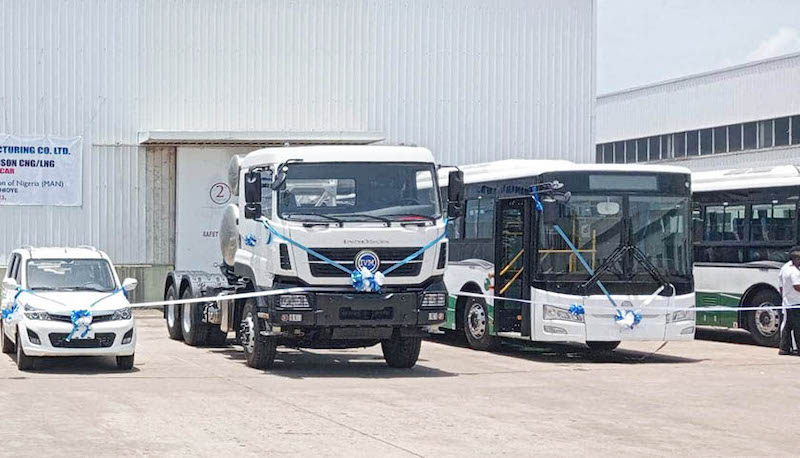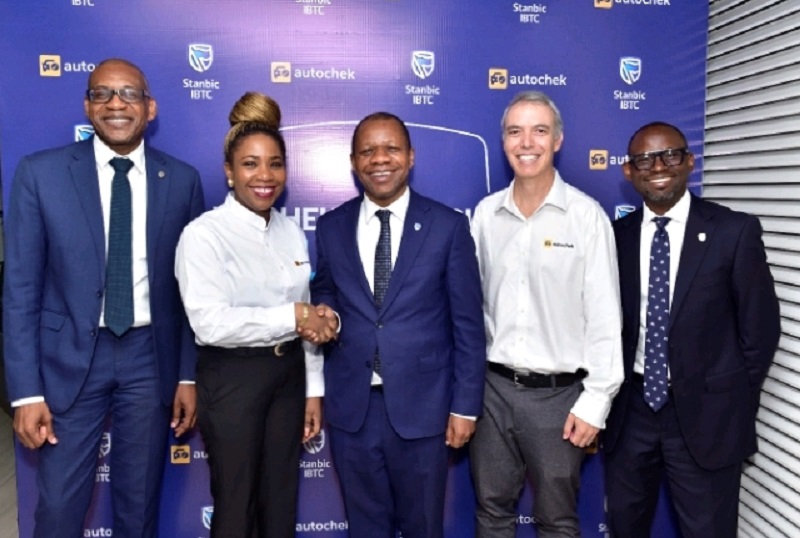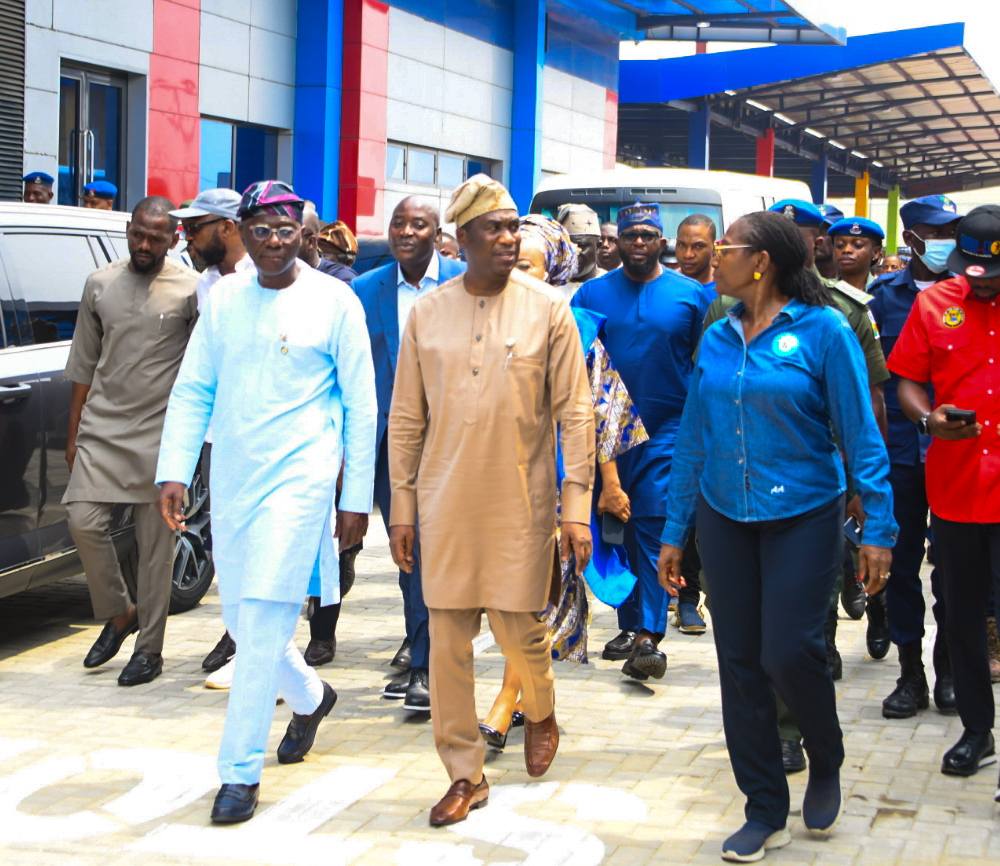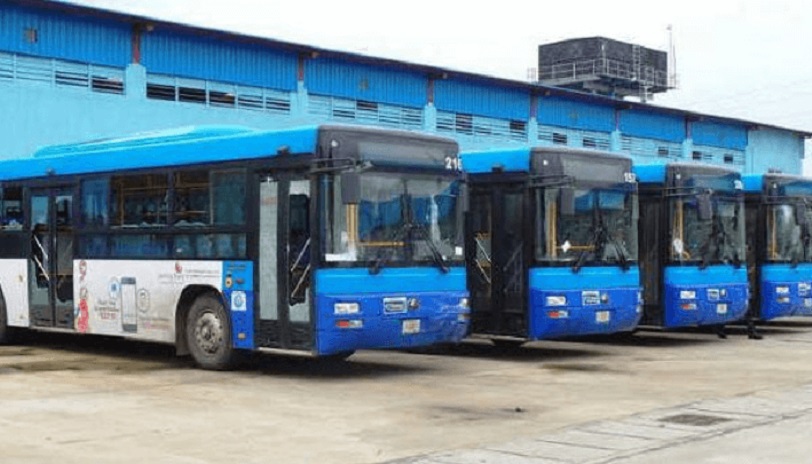Auto
Nigeria Attracts $175m From CNG Initiative

By Adedapo Adesanya
The federal government claims the presidential Compress Natural Gas initiative has unlocked $175 million in private-sector investments in critical infrastructure in the last year.
The Minister of Information and National Orientation of Nigeria, Mr Mohammed Idris, gave the update in a statement on X on Tuesday as part of milestones achieved as the country marked its 64th Independence Day celebration.
According to him, Nigeria now has 125 conversion centres, up from just seven a year ago.
Mr Idris also said that the biggest advantage is that CNG is much cheaper than petrol and diesel, and will help bring down the cost of transportation and commuting by over 60 per cent.
“One of the biggest issues in the country currently is the cost of transportation and commuting, on account of the removal of petrol subsidy.
“This has led to the launch and rollout of a national program to make Compressed Natural Gas (CNG) the vehicle fuel of choice in Nigeria.
“It is also a cleaner fuel, and better for the environment. For a country as blessed with gas resources as Nigeria, CNG is a smart and welcome bet on the future,” he said.
“In the last year, the presidential CNG initiative has unlocked $175 million in private sector investments in critical infrastructure, and Nigeria now has 125 conversion centres, up from just seven a year ago.”
He spoke to the commencement of petrol refining by the Dangote Refinery, saying that the development had rewritten Nigeria’s story from negative to positive.
“In September, the world’s largest single-train crude oil refinery began producing petrol for the Nigerian market, instantly rewriting the existing narrative of an oil producing country that is forced to depend exclusively on imported petrol.”
He also confirmed that Dangote Refinery would begin to pay for crude supplies in naira starting this month.
“Starting this month, the Dangote Refinery will pay for crude oil supplies in Naira, in a welcome decision approved by President Tinubu to bring down the cost of locally produced petroleum products.
“Also, the new Presidential Gas for Growth Initiative is implementing a zero-per cent VAT regime on a wide range of the sale of gas and gas-related equipment.
“In addition to transport costs, the Federal government is also targeting food and pharmaceuticals, to bring prices down.
“President Tinubu has approved the temporary removal of import duties and taxes on certain essential food items, as well as pharmaceutical raw materials and equipment.
“We acknowledge that it will take some time for the effect of these actions to be felt in the market, and the pockets of Nigerians, and we ask for patience and understanding as the implementation is fine-tuned.
“The results will certainly be felt, in no distant time. Initiatives like the Nigerian Education Loan Fund (NELFUND) and the Nigerian Consumer Credit Corporation (CrediCorp) are putting money in the pockets of students and workers respectively, enabling people to pursue their dreams of completing education, starting and growing businesses, advancing careers, and affording life’s necessities.
“At the end of the day, this is what matters the most to the people of Nigeria, and it is what we exist for as government: to make life better for all, ensuring no one is left behind.
“There’s something for everyone, and I urge all Nigerians to actively look for which of these many transformational programs and opportunities they can benefit from.
“Government exists to make life better, but this can only happen when the people are aware of opportunities and keen and ready to engage.
“Happy 64th Independence anniversary to the nation and people of Nigeria!”
Auto
Stanbic IBTC Bank Partners Autochek to Boost Auto-financing, Disburses N4bn

By Adedapo Adesanya
A top financial institution in Nigeria, Stanbic IBTC Bank, has partnered with Autochek, an automotive technology firm, to facilitate accessible and affordable car ownership in Nigeria.
This vehicle-financing collaboration combines Stanbic IBTC Bank’s extensive financial expertise and network with Autochek’s cutting-edge technology platform and robust dealer distribution network; streamlining the car-buying process and making it more accessible and affordable for Nigerians.
The car financing programme offered through this strategic alliance provides several key advantages for customers including competitive interest rates that enhance affordability, as well as flexible repayment plans.
Within six months, the collaboration has disbursed over N4 billion in loans since its inception in August 2024 furthering empowering numerous individuals to purchase their desired vehicles.
According to the company, there are approximately N1 billion in deals that are currently being processed.
The partnership is poised for continued growth and impact on the Nigerian automotive landscape, according to Mr Olu Delano, Executive Director, Personal and Private Banking at Stanbic IBTC Bank.
He made this known while speaking at the media parley held in Lagos to engage stakeholders in the industry.
“We are incredibly excited about the tangible impact of our collaboration with Autochek. This partnership has significantly lowered the barriers to car ownership; making it a reality for many Nigerians. At Stanbic IBTC Bank, we are dedicated to providing innovative financial solutions that cater to the evolving needs of our customers.
“We are committed to the long-term success of this partnership and its contribution to the growth and development of Nigeria’s automotive industry,” he added.
On her part, Ms Mayokun Fadeyibi, Chief Operating Officer at Autochek, highlighted the transformative nature of the partnership.
“Our collaboration with Stanbic IBTC Bank has revolutionised the car-buying experience in Nigeria. By leveraging technology and strategic partnerships, we have made car ownership more accessible, convenient, and transparent.
“We share Stanbic IBTC Bank’s commitment to driving growth in the automotive sector and look forward to expanding the reach and impact of this partnership.”
The partnership comes with a swift and efficient application process, that will allow customers to enjoy a smooth and convenient experience.
Also, Autochek’s platform and extensive dealer distribution network give customers access to various vehicles, ensuring they can find the perfect car to meet their needs.
Auto
Lagos Reduces Red Line Train Fares by 30% to N1,000

By Modupe Gbadeyanka
The Red Line train fares have been slashed by the Governor of Lagos State, Mr Babajide Sanwo-Olu, by 30 per cent to N1,000 from N1,500.
Mr Sanwo-Olu announced the cut in the fares on Tuesday during the commissioning of the Abule Egba Bus Terminal in the Orile-Agege Local Council Development Area (LCDA).
He disclosed that the intra-city rail transport was to make life easier for residents of the metropolis, noting that his administration was to enhance seamless mass transportation from the suburb to other parts of the state.
The bus terminal is strategically situated close to Lagos Red Line corridor, reflecting the government’s commitment to continuously enhance public transportation systems, strengthening connectivity and improving the overall experience for commuters.
Business Post reports that the Abule Egba Bus Terminal has features like loading bays, a terminal building with a customer service area, a waiting area, spaces for restaurants and other commercial services, offices for ground staff, public conveniences, a water treatment plant and provision for green energy, among others.
“This is a public bus terminal that will aid seamless commuting from here to other parts of Lagos. This infrastructure reflects our commitment to continuously enhancing public transportation systems, strengthening connectivity, and improving the overall experience for commuters.
“We are dedicated to taking ongoing steps to advance and modernise transportation across the state,” Mr Sanwo-Olu disclosed, noting that efforts are being made to build two additional interchange hubs in Marina and Mile 2, while another bus terminal is at the advanced stage of construction in Iyana Ipaja axis.
He also announced that the state was expecting the arrival of new Compressed Natural Gas (CNG) buses and electric buses by the third quarter of the year to enhance bus services, urging residents to take ownership of the projects.
“This infrastructure has been made possible through your tax contributions. I urge you to take pride in it, protect it, and ensure that it remains safe from any harm or damage.
“By safeguarding these assets, we can all benefit from their long-term value and continue to build a better future for our community,” he stated.
On her part, the Managing Director of the Lagos Metropolitan Area Transportation Authority (LAMATA), Mrs Abimbola Akinajo, said bus terminals “offer central location for passengers to board and connect to other forms of transportation.”
According to her, the Lagos State government has provided bus terminals in Ikeja, Oshodi, Ajah, Oyingbo, Yaba, Ojota, Ifako Ijaiye and now at Abule Egba, with Iyana Ipaja bus terminal to be launched soon.
Auto
Lagos Hikes BRT Fares by 18% Over High Operational Costs

By Adedapo Adesanya
The Lagos Metropolitan Area Transport Authority (LAMATA) has increased fares for the Bus Rapid Transit better known as BRT across the state.
According to the Lagos State agency, an 18 per cent increment on all the routes will take effect from Monday, February 17, 2025.
This will impact Lagos commuters who already have to contend with high cost of food and energy amid a wider cost of living crisis in the country. Businesses are also not exempt as many workers commute to their various destinations via BRT buses.
“Please be informed that there will be an 18 percent increase in the bus fare on all Bus Reform Initiative (BRI) schemes,” part of the notice read.
“The fare increase is because of the increase in the cost of operations and the need to ensure that buses keep running and guarantee your movement around Lagos,” it added.
LAMATA called for the “understanding and cooperation” of passengers amidst the increment.
The Lagos State government had in November 2023 cancelled the 50 per cent transport fare discount on all BRT and reverted to the old prices.
“The 50 per cent rebate in transport fare in the regulated transport system in Lagos ends on Sunday,” LAMATA said then. “The statement informed commuters that starting “from Monday, November 6, 2023, transport fare will return to the pre-2nd August 2023 rate.”
Governor Babajide Sanwo-Olu had in July of that year reduced the transport fares for the state-owned buses and commercial buses by 25 per cent on all routes.
The moves were parts of efforts to cushion the impacts of the removal of fuel subsidy by the President Bola Tinubu government.
Mr Sanwo-Olu also said his administration was expanding its fleet of staff buses for workers in the Lagos State Public Service.
He said that the buses are ready and will be deployed through the office of the Head of Service of the state.
-

 Feature/OPED5 years ago
Feature/OPED5 years agoDavos was Different this year
-
Travel/Tourism9 years ago
Lagos Seals Western Lodge Hotel In Ikorodu
-

 Showbiz2 years ago
Showbiz2 years agoEstranged Lover Releases Videos of Empress Njamah Bathing
-

 Banking7 years ago
Banking7 years agoSort Codes of GTBank Branches in Nigeria
-

 Economy2 years ago
Economy2 years agoSubsidy Removal: CNG at N130 Per Litre Cheaper Than Petrol—IPMAN
-

 Banking2 years ago
Banking2 years agoFirst Bank Announces Planned Downtime
-

 Sports2 years ago
Sports2 years agoHighest Paid Nigerian Footballer – How Much Do Nigerian Footballers Earn
-

 Technology4 years ago
Technology4 years agoHow To Link Your MTN, Airtel, Glo, 9mobile Lines to NIN











